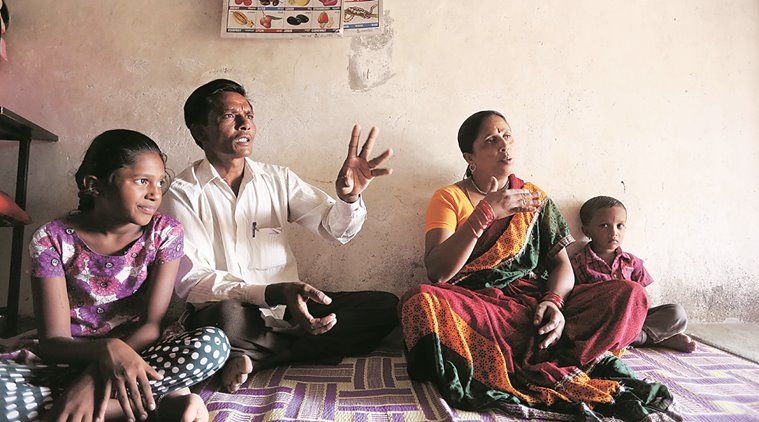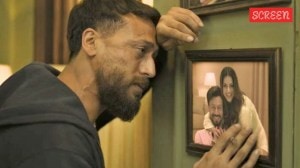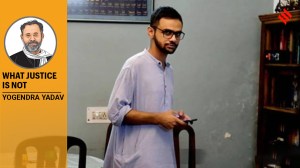Stay updated with the latest - Click here to follow us on Instagram
Gender parity initiative alters views on what is masculine: ‘A man is not a man if he beats his wife’
In the past five years, the men in this village have grown conscious towards women issues, specially their education.
 Omakant Gadhwe with wife Ambika, who is the sarpanch of Boregaon village.
Omakant Gadhwe with wife Ambika, who is the sarpanch of Boregaon village.
On May 9, when Yakub Kurne got his sister Tasneem married at 18, it was a transformation for the Muslims in Motyal, a sleepy village in Maharashtra. Until a few years ago, his other sister was married when she was in Class 7, barely 13. In the past five years, the men in this village have grown conscious towards women issues, specially their education.
The change is not limited to Motyal. Some kilometres away, villager Babasaheb Mane feels a stronger man — he is more sensitive towards his wife now. In Bavkarwadi, a reserved village on the fringes of Solapur, Mane, 40, asks for his wife’s permission every time he approaches her for sex. His wife Saroja, 35, smiles shyly. Temperature is soaring beyond 40 degrees and she has pulled her pallu away, revealing her face in a rare gesture not any more rare for women in this village. “Three years ago, I would have never thought this is possible. to know what her sexual preferences were,” he says in Marathi.
Painted in red, a message outside his grocery shop’s wall reads to passersby, “Mat karo ling nidaan, ladki hai desh ka abhimaan (Don’t discriminate on gender, a girl is a nation’s pride.” In this village, men have stopped child marriage and elimination of dowry is following.
 Babasaheb Mane, who owns a grocery store in Bavkarwadi village, with wife Saroja and children
Babasaheb Mane, who owns a grocery store in Bavkarwadi village, with wife Saroja and children
For Mane, and 3,000 men in villages outlining Solapur, Beed and Pune, the definition of masculinity has changed in the last five years — from being physically dominating to being sensitive towards women, from yearning for a son to equal love for daughters.
Fixing his eyes on a mud-plastered floor, he says, “Earlier, I would get angry if she didn’t respond well to our physical relation. Now, I control my anger. If she does not want to do it, I don’t force her.”
***
The change in men has surprised many, including NGO Centre for Health and Social Justice (CHSJ) and project-funder United Nations Population Fund that spearheaded the concept without anticipating such response in these 100 villages. Satish Singh, from CHSJ, says the programme began with an aim to improve women’s health and status in society. “We realised men are a hurdle in women’s development. We first need to tackle men and change them. Their change will trickle into the family and later the society.”
What was initially resisted by villagers soon spiralled into a self-driven movement of sorts.
[related-post]
Watch Video: What’s making news
In 2010, 40 villages in Solapur, 40 in Beed and 20 in Pune were selected. A local from each village was picked and first counselled over women’s rights and needs. It took one year for volunteer Gauri Shankar Dodyal, 30, to change his mindset. “A lot of mentors held group discussions with us, counselling us to question traditions that existed for hundreds of years,” he says.
In Chapalgaonwadi village near the Karnataka border where he lives, women would eat only after men finish their meal. In 2012 after his marriage, Dodyal broke the norm — he ate along with his mother and wife. After months of disapproval, his retired father and brother followed suit.
When Dodyal started sweeping the house every morning, laughter by neighbouring men soon turned into respect. “They started sweeping too after their wives praised me,” the lean man smiles proudly.
His friend Ratnakant Shetty, a construction manager, then took the lead to hold monthly gatherings of men in the village chowk to change the existing definition of “mardaanagi (masculinity)”. “A man is not a man if he beats his wife, he is a man if he gives her equal rights,” he says to a circle of dusky men sitting cross-legged on a verandah.
Almost a year after 100 volunteers like Shetty from each village were counselled, they were asked to hold similar gatherings in village squares. “We would subtly pass on the message. Suggest men to make tea for their wife and see their response,” says Kurne, a volunteer from Motyal.
In Motyal, a village of 1,500 people, the group discussions would be laughed at initially. “Hamare ghar ka hum dekh lenge, tum mat samjhao (We will look after our houses, you don’t tell us what to do),” would be the usual comeback.
From 2011 to 2013, the transformation became palpable, drawing attention of village women who even now eye men squatting in a circle deep in conversations.
In July 2015, when UNFPA and CHSJ ended the project they named ‘Samajhdar Jodidar’, villagers continue even now to gather and discuss women issues. A pack of 11 books, translated into Marathi, on transformation of an adolescent girl’s body into a woman’s is passed around to read in Motyal. It has sketches of how a woman’s body changes during early menstruation.
Cattle-rearer and father of three girls, Chand Phulari, 46, has completed all 11 books and is keen to read more. He has perhaps shown the maximum transformation yet in Motyal. “Three years ago, I was considering a second marriage. My wife could not give birth to a son and I was angry…I felt trapped with three daughters,” he confesses.
It was with Kurne he first shared the thought of a second marriage. By then Kurne was already counselling several men on women rights. “I explained to him how a wife is not responsible for girl or boy…,” says Kurne. It took months before Phulari followed suit of other villagers in helping their wives with daily chores.
On May’s hot summer evening, as his wife Mehboobi sat with daughter Sameena to rest, Phulari filled a bucket from a nearby handpump for her. “He sweeps every morning,” she says in awe, adding slowly, “I am relieved he does not want to marry another woman. He now wants to educate our girls.”
In Chapalgaon, a few kilometres from Motyal, men too have curbed the practice of early marriage for girls. “But there is a long way to go. We are trying to end dowry now,” says Sunil Karande, 26, who married in 2012 and refused to accept any ‘gifts’ from the bride’s family. “The family was surprised. I liked their reaction,” he smiles.
***
“There is no book which says woman can’t work like men,” declares Omakant Gadhwe. In 2012, his wife Ambika, 25, became the first woman sarpanch in Boregaon, a village with a 1,570 population where of 400 villagers who voted, 222 chose her.
The gram panchayat election was a revolution within the village limits, because all the men who had been counselled over what defines masculinity had decided to bring in a woman sarpanch. The panchayat now has four women and three men. Under Ambika, the village constructed 65 toilets to end open defecation.
As she cooks poha while simultaneously handling her daughter, she discusses how she wakes up at 4 am on days she has panchayat work to attend. “Earlier, I would never step out,” she says to which her mother-in-law adds, “In my time, I never removed pallu, never spoke in front of other men.”
Ambika, a tenth pass-out, was married in 2008. For the first four years after marriage, she did household work, until volunteers started gathering men in evenings. She saw her husband change. He would take care of children and ask her to rest, talk to her more often. “Sharirik rishte se aage badhe (He went beyond just physical relation).”
Omakant makes morning tea and heats water, he smiles, then feels bad, “I could do little to improve my mother’s social status.” But his mother is content for Ambika is learning the workings of panchayat and even gives speech during Independence Day. “Earlier only men would hoist the flag,” says another villager Manikchand Shetty.
Ambika along with her friend Suramdevi Khandekar now gathers women to advocate about their rights. “My husband gets grocery, fills water, and looks after children while I am on streets looking after local issues. It started three years ago,” Khandekar smiles.
According to Dr Shashikant Ahankari, founder of NGO Halo Medical Foundation that provided local support and training for this project, villagers continue to counsel more men even as the project has ended and no funds are provided to volunteers. “Once men decide to respect women, the society does. We saw some wonderful changes in these villages,” he said.







